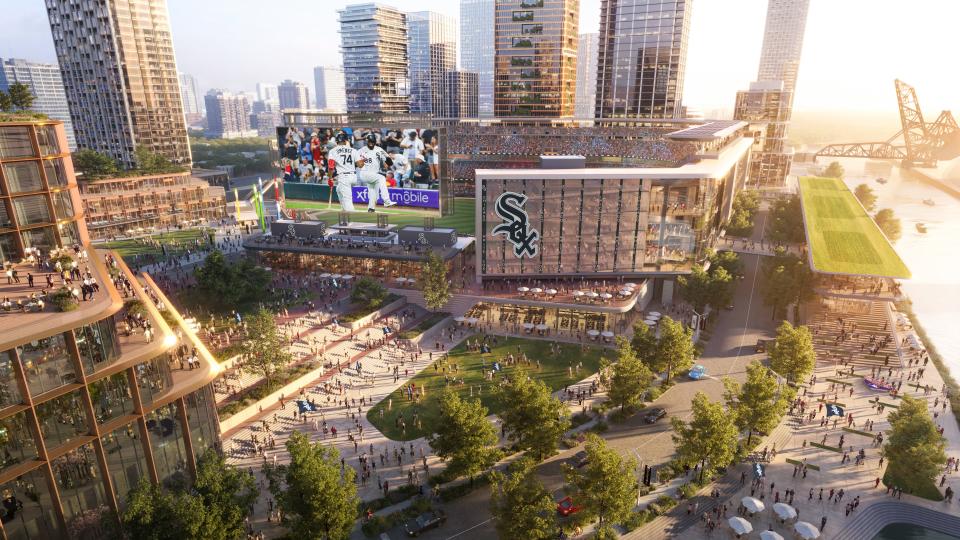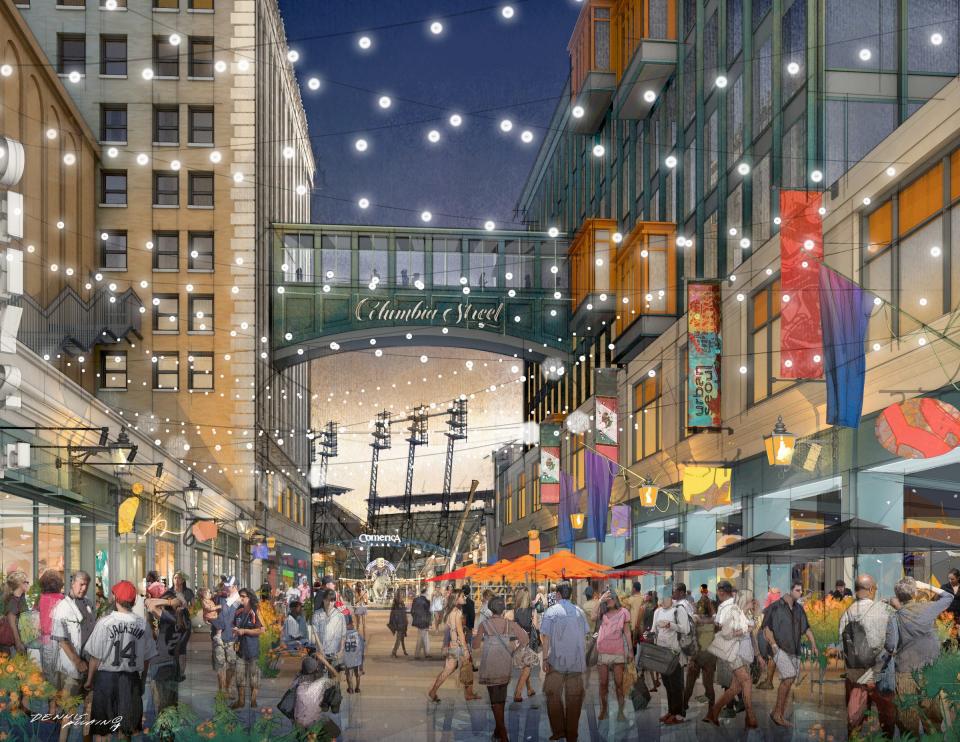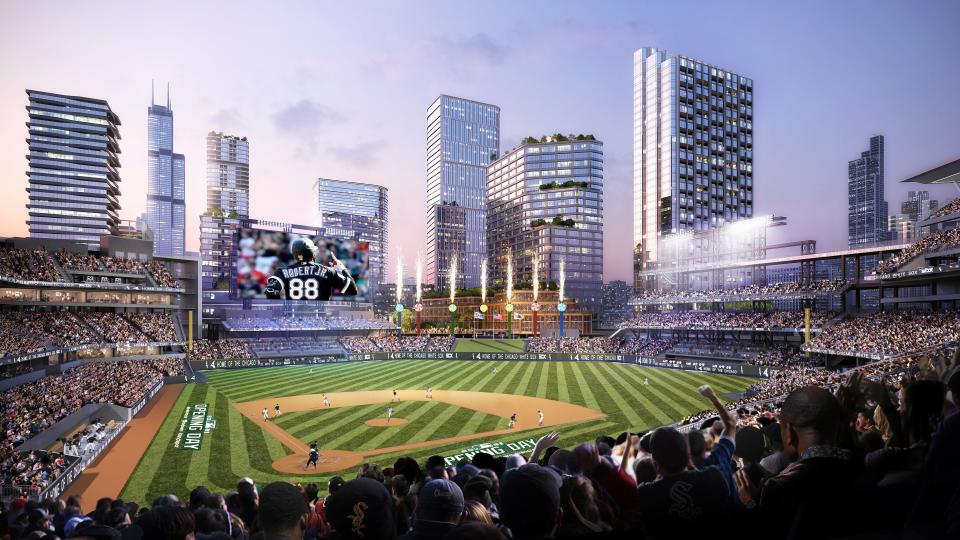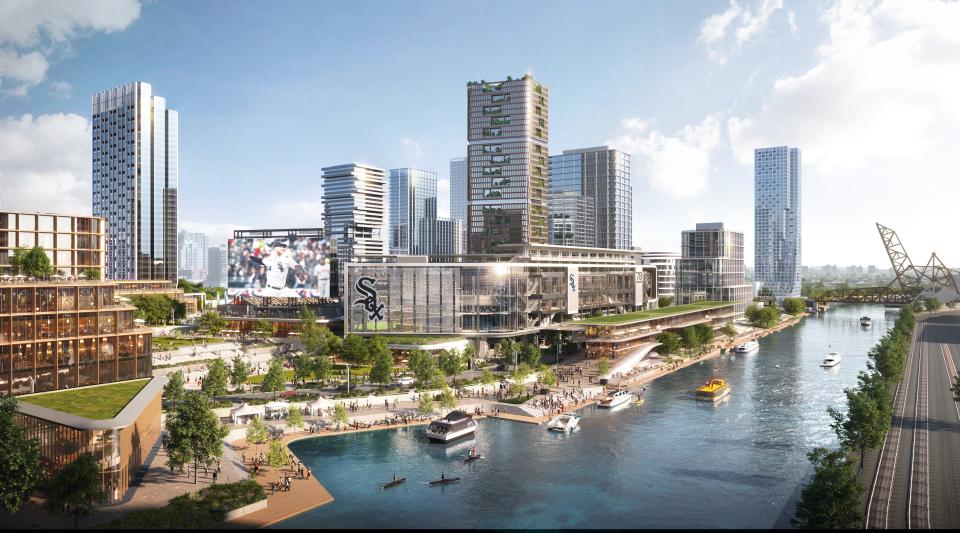Rubin: Hey, Chicago — take a lesson from floundering District Detroit
- Oops!Something went wrong.Please try again later.
The Chicago White Sox want a new stadium south of downtown, and you should see the renderings.
There's the ballpark, of course, on a premium 62-acre plot along the Chicago River in the South Loop. A hotel and residential units, shimmering in the sun. A lovely plaza. Bars, restaurants, soft-serve ice cream for everyone and unicorns shooting glitter out their horns.
As I gaze upon the verdant parking lots of District Detroit, I have but one piece of advice for our fellow Midwest metropolis:

Get everything in writing, ideally in blood. And actually, here's a second piece: Make sure the stadium is the last thing to go up, because once baseballs are flying or basketballs are bouncing or pucks are sliding, team owners tend to lose interest in the pretty pictures.
At least, that's how it worked here with Comerica Park and Little Caesars Arena.
The sales pitch for District Detroit in 2013 was that we'd get five new neighborhoods in 50 walkable blocks with housing, shopping, office space, parking and scads of jobs, all in exchange for a measly $324 million in tax incentives for the $863 million arena.
What we've basically seen so far from the Ilitch organization are parking lots and special home-grown Olympia Development parking tickets, plus one office building, that new Little Caesars headquarters with pizza-slice-shaped windows that kept breaking, and the refurbishment of the former Hotel Eddystone that began a year after the apartment building was supposed to be completed and was goosed along by an added $33 million performance bond.
The Ilitches own the Tigers, Red Wings and the pizza chain, and it's important to remember that along with theater district preservationist Chuck Forbes, they were first responders — rushing into downtown Detroit when everyone else was racing out, resurrecting the Fox Theatre, relocating their business.
As public policy consultant Francis Grunow will tell you, though, it’s also important not to forget Foxtown, or anyway, what Foxtown was supposed to be.

A baby of a ballpark
Grunow, 49, sat on the neighborhood advisory committee in the infancy of the arena project. With a background in urban planning and a lifelong affection for his home city, he has kept a steely eye on the major ventures downtown.
“The renderings for the area around Comerica Park were full of bars and restaurants in an entertainment district,” he said, and that helped pass a ballot question to provide public money for the stadium after a first proposal struck out.
“The Ilitches would say that by letters of agreement, they’ve done a fine job,” Grunow acknowledged, and in fact, Olympia has said exactly that.
But “the public perception of what a project should be and what a team is legally bound to can be very different," he said, and the wide gap between renderings and reality can turn saints into St. Bernards in the public eye.
You could multiply Detroiters' annoyance with the Ilitches by Miguel Cabrera's 511 career home runs, however, and still not reach the level of enmity Chicagoans feel for the tone-deaf billionaire who owns the White Sox.
Jerry Reinsdorf is a real estate whizbang who also owns basketball's Chicago Bulls. Among the things he has learned in his 87 years is that if you threaten to move a sports franchise to another city, someone will start signing blank checks to keep you.
The White Sox, the South Side's team, played in Comiskey Park from 1910 through 1990. After Reinsdorf started winking flirtatiously at Florida in the 1980s, the governor leaned on the legislature to hand over $150 million to build what's now known as Guaranteed Rate Field.
About that time, preservationists were rallying to keep the Ilitches from replacing Tiger Stadium. The bulldozers won, as they tend to, but the delay kept the stadium upright until the Baltimore Orioles opened Camden Yards and everyone figured out that a new baseball stadium didn't have to be an unwelcoming cookie-cutter bowl.
Guaranteed Rate, built at Reinsdorf's insistence and on his timeline, turned out to be the last boring ballpark. It sits in the former parking lot of Comiskey Park next to not much of anything, and Reinsdorf wants to replace it because the surroundings are exactly the asphalt island he signed up for.
Last week's announcement did not touch on details like cost and who would pick up the tab, though the Chicago Sun-Times did say that developers "hope to use flashy drawings and a rosy financial forecast" to squeeze a large financing package out of the Illinois General Assembly.
The release did suggest smartly that Guaranteed Rate Field, which would be only 38 years old when the Sox's lease expires in 2029, could be tweaked into a nice soccer stadium.
That's considerably better than letting it molder, since the government agency that owns the place still owes $50 million on it.
Familiar name, familiar delays
The beautiful new development with its affordable housing, 4,000 other residential units, and smorgasbord of dining establishments would sit on a former railroad yard its owner calls "The 78," as in Chicago's 78th neighborhood.
The owner is Related Midwest, and therein lies two more differences from the Ilitch organization and one connection to it.

Difference No. 1 is that Related Midwest bought the entire parcel at once. Olympia surreptitiously pieced its arena acreage together, letting parts of it fall into blight before construction finally began.
Difference No. 2 is that Related Midwest is part of New York-based Related Properties and has a reputation for getting things done — as does its owner, Stephen Ross.
That's Ross as in the Ross School of Business at the University of Michigan, as in the Miami Dolphins, as in offices and projects from Chicago to Abu Dhabi.
Also, as in a partnership with the Ilitch organization announced last year to build or redevelop 10 properties in District Detroit.
They insisted on $797 million in incentives and got them, even though some of the buildings would be offices at a point where people have shown a preference for working in their pajamas. But it turns out District Detroit 2.0 is already well behind schedule.

Maybe they just need more renderings.
Reach Neal Rubin at NARubin@freepress.com.
To subscribe to the Free Press at discount rates, click here.
This article originally appeared on Detroit Free Press: A lesson for Chicago from District Detroit: get it in writing

